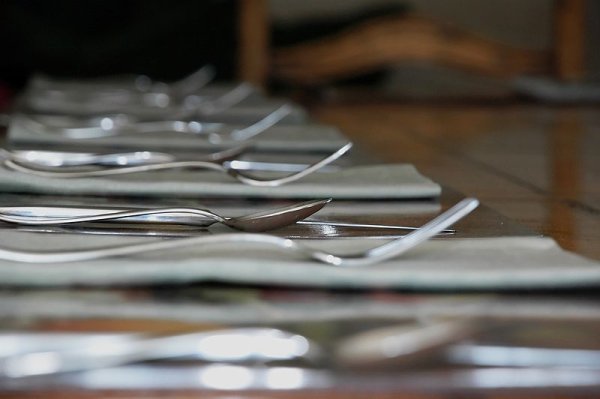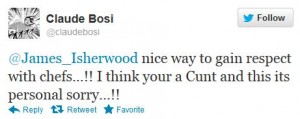When food blogging hits the national headlines, it almost always makes for interesting and thought-provoking reading. Earlier this year we had the case of Martha Payne, a 9 year old whose daily blog about her school lunches (NeverSeconds) – complete with a health rating and an overall score for each meal – made the press. Martha then made further headlines when her headmaster told her to stop blogging, with her local authority claiming that her blog had led to catering staff fearing for their jobs after headlines such as “Time to fire the dinner ladies”.
Celebrity chef Jamie Oliver backed the campaign to have Martha’s blog reinstated, and since then, the young blogger has raised thousands of pounds for charity Mary’s Meals, which provides meals to children in schools in Malawi and other countries.
Celebrity chefs have also been involved in the most recent food blogging press sensation…but by no means in a positive light.
Meet James Isherwood and his blog, Dining With James. James only started blogging in July 2012 and at the time of writing (mid-November 2012) had only 12 reviews online and under 200 followers on Twitter. I think it’s probably fair to assume that his following was fairly small until he published his review of Hibiscus, Claude Bosi’s two Michelin-starred London restaurant. Two Michelin-starred it may be, but that doesn’t necessarily guarantee an amazing experience. While James was positive about the majority of his evening, he expressed his more negative opinions about the starter, said that he didn’t find the service up to scratch, and ended by saying that – in his opinion – you could find a better two-starred meal at either The Ledbury or Marcus Wareing at The Berkeley.
And then it all kicked off. Bosi himself read the review, took offence, and took to Twitter to express his opinion of James (apologies for the language – it’s a direct copy and paste!)
If this wasn’t bad enough for James, the conversation continued, and other chefs – namely Tom Kerridge and Sat Bains – decided to add their opinions to the mix. Both have since deleted their tweets (probably wise…), but you can see quotes and read the full story on the Guardian website.
I guess there are two angles to this story. Firstly, how do bloggers feel when they are singled out for criticism? And secondly, what do those who criticise hope to achieve?
As someone who writes publicly about meals out (from a personal, member-of-the-public point of view – I certainly don’t claim to be a “professional”), I’ve had my fair share of criticism: publicly via Twitter, in comments on my site and even tucked away in other people’s articles (you know who you are). Speak to any fairly established blogger and they’ll no doubt have a story about “comment trolls” or abuse via email or social media – it comes with the territory.
The point is, however, that the majority of us are writing because we love it: we enjoy putting pen to paper (or fingers to keyboard), and love having an outlet from which to share our opinions. There has been a lot of talk about whether bloggers are actually qualified to write about their meals…do they have a background in the catering industry? Do they have qualifications in journalism?
For the most part, the answer is no – and rightly so. Blogs are designed to be opinion-based. From my point of view, when I add anything to the “Reviews” section of Bites, it’s about sharing my thoughts – and here’s the important part – as a consumer, as a member of the public would view their meal. I don’t profess to be a qualified chef or food writer. I just know what I enjoy, know what makes a good meal into a great meal for me, and like to share my opinion.
Other local food bloggers agree, as comments I’ve received via Twitter and Facebook about this subject show:
“The fact that such influential people think they should be able to stifle thought and opinion in this way is sickening. The fact that some people think you need qualifications to write about your passion incenses me.”
“I think this is sad, lots of people (myself included) write a blog as a platform for sharing a passion as well as a means of escapism/enjoyment. It doesn’t matter how many posts he has written or how ‘amateur’ his views…he is enitited to speak as he finds and if some ‘professional’ chef can’t handle a little criticism (which ironically he has actually drawn attention to with his inappropriate public outburst) then he really isn’t professional at all…in fact, just a bully”
As mentioned earlier, I’m not entirely sure what Bosi, Kerridge and Bains hoped to achieve with their reactions. I certainly think Bosi’s shot himself in the foot, judging by the comments on the Guardian article, on James’ blog post and on Twitter. Surely the best way to approach criticism is to deal with it in a way that doesn’t lead to the national press picking up the story and potentially millions of people turning against you for the way you treat a humble blogger?
I’ve had my fair share of meals where not everything was great…and the best reactions are from those restaurant owners/chefs who take the time to explain the issue and that it will be resolved in the future. As examples, see The Square Club’s comment underneath my review of their tasting menu, and La Riva replying to negative comments by those reading my review from July 2010.
Lynne, via Twitter, agrees:
“I’ve seen chefs and restaurants respond to negative reviews before in such a dignified manner that it’s made me overlook the experience the reviewer had and still want to go. The way Bosi and pals responded made me overlook a fairly inoffensive review and think far worse things of them than if it had been damning.”
What are your thoughts? How should chefs and restaurateurs reply to negative comments on social media and blogs – if at all? Have you had any positive or negative experiences that have changed your views of a venue, either for the better or for the worse?


Some good questions, Emily, and I would offer two comments: one, you are a professional from the moment you make money from an activity whether you want the responsibility of being one or or not; two, the only qualification needed is knowledge of the law, so you don't get sued.
Ultimately the blogger / journalist / writer who doesn't work for a publication has no legal team, no editor and is up against anyone who wants to complain or sue.
If you can't defend what you write in a public forum then maybe don't write it while realising you are perfectly entitled to an opinion no matter what anyone says.
There more I hear about James Isherwood, the more it makes me laugh & cry in equal amounts. He is listed on Journalism.co.uk ( http://www.journalism.co.uk/freelancers/2798 ) and so he's probably angling for paid writing work.
I've been blogging for nearly 3years, built up a loyal following & a nice archive to boot. But paid writing work has only really just started to make an appearance, there have been inquiries but nothing firm to speak of.
James Isherwood has milked this to the n'th degree and quite frankly has put blogger/chef relationships back yrs. That's not to say I agree with what any of the chefs involved actually did either.
Lately Mr Isherwood has protected his twitter account, why, probably because the level of support has waned & he struggles with replying to people probing him. He's had his 15minutes, lets move on.
Oh & just to qualify my own blog. 20+ yrs in the industry working upto & including 1 michelin star, 3AA Rosettes, Red star properties & Relais and Chateau.
Think I know a little bit more about food than Mr Isherwood
Sometimes, chefs can't handle criticism and at times, food critics go overboard just for the sake of the self gratification of being articulated. Food mags don't do this.